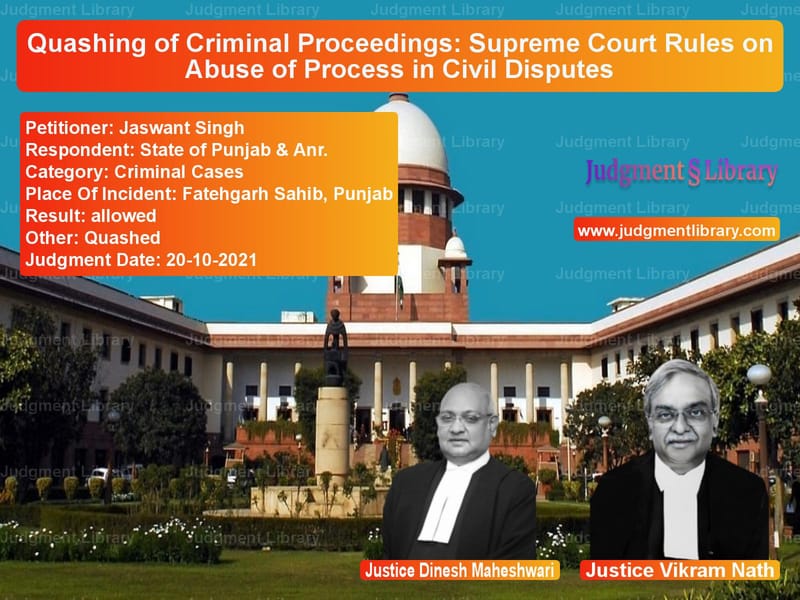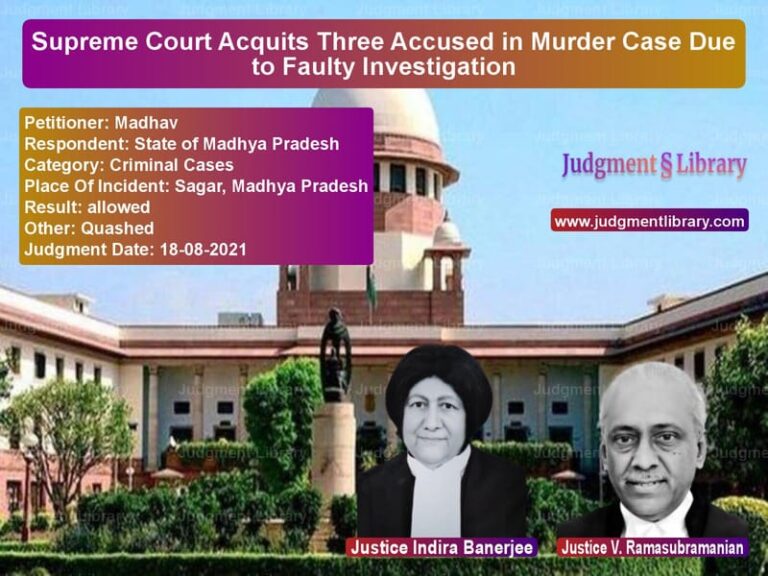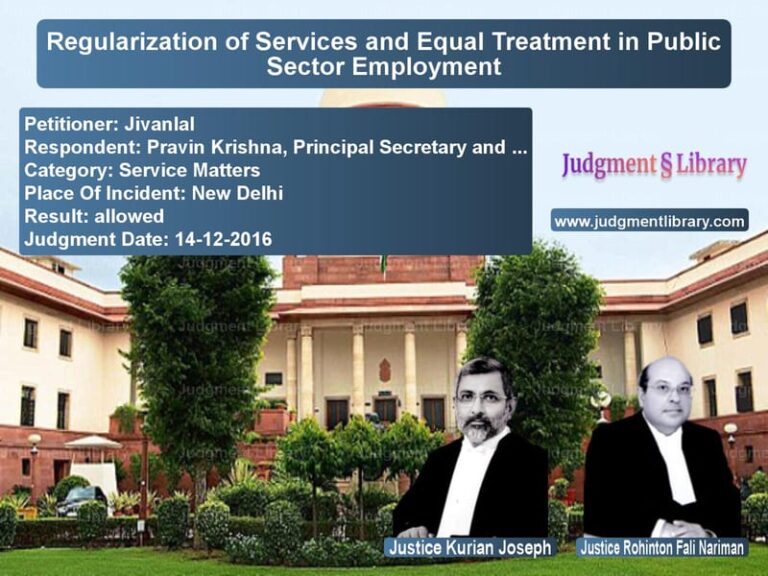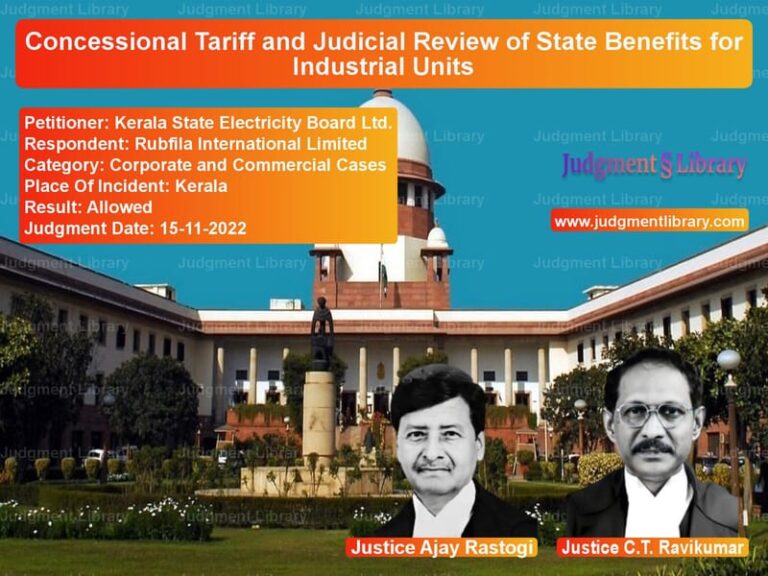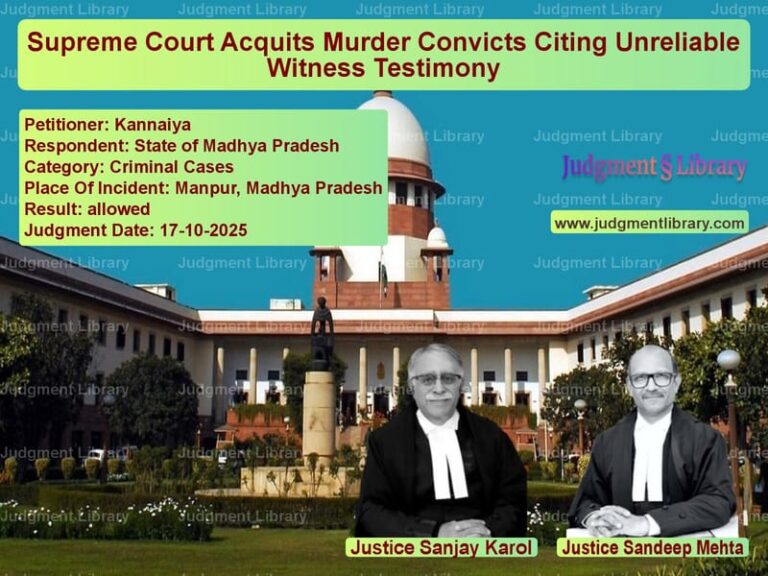Quashing of Criminal Proceedings: Supreme Court Rules on Abuse of Process in Civil Disputes
The Supreme Court of India, in Jaswant Singh vs. State of Punjab & Anr., dealt with the issue of quashing criminal proceedings under Section 482 of the Criminal Procedure Code (CrPC). The Court emphasized the importance of distinguishing between criminal and civil disputes, noting that proceedings for alleged offences with a civil flavour, like breach of contract or financial transactions, could be quashed if the dispute has been amicably resolved between the parties. The judgment highlights the Court’s inherent powers to prevent the abuse of judicial processes in cases where continuation of proceedings would result in oppression or injustice.
Background of the Case
This case arose from an FIR registered on October 29, 2009, at Fatehgarh Sahib Police Station, Punjab, alleging that the appellant, Jaswant Singh, along with his co-accused, had cheated the complainant, Nasib Singh, by promising to arrange employment for his son in Italy, in exchange for a payment of Rs. 7 lakhs. The complainant alleged that his son was sent to Italy but did not receive the promised job, and upon demanding a refund, further threats were issued. The complainant accused the appellant of breach of trust and cheating under Section 406 and Section 420 of the IPC.
The investigation concluded that while one of the accused, Gurmeet Singh, had been directly involved in the transaction, there was insufficient evidence against Jaswant Singh and Gurpreet Singh. Despite this, the Trial Court invoked Section 319 CrPC to summon them to face trial.
Proceedings and Legal Challenges
The appellant, Jaswant Singh, was declared a proclaimed offender on April 28, 2014, as he had absconded to Italy. After a few years, he filed a petition under Section 482 CrPC before the High Court to quash the proceedings, particularly in light of a settlement between the complainant and the main accused, Gurmeet Singh, in September 2014, which had resulted in the offence being compounded against Gurmeet Singh. The High Court, however, rejected the appellant’s petition, leading to his appeal before the Supreme Court.
Arguments Presented
Appellant’s (Jaswant Singh) Arguments:
- The dispute was essentially of a civil nature, related to an agreement and money transfer, and therefore did not warrant criminal proceedings.
- The complainant had already entered into a compromise with the main accused, Gurmeet Singh, and the offence had been compounded in 2014.
- The trial court should not have summoned him under Section 319 CrPC based on insufficient evidence.
- The High Court erred by not exercising its powers under Section 482 CrPC to quash the proceedings, particularly after the settlement.
Respondent’s (State of Punjab) Arguments:
- The FIR clearly mentioned the appellant’s involvement in the cheating and breach of trust.
- Section 319 CrPC allowed for the summoning of additional accused when there was enough prima facie evidence, which was the case with Jaswant Singh.
- The compromise between the complainant and the main accused did not extinguish the appellant’s liability, especially in cases involving criminal breaches of trust.
Supreme Court’s Ruling
The Supreme Court ruled in favor of the appellant, quashing the proceedings against him. The Court made the following key observations:
On the Nature of the Dispute:
The Court emphasized that the dispute had an overwhelmingly civil nature, revolving around a financial transaction and an alleged failure to fulfill contractual obligations. The Court held:
“The allegations are primarily of a breach of contract and involve a financial settlement, which can be resolved through civil proceedings. There is no prima facie case for criminal cheating or breach of trust.”
On the Compromise Between the Parties:
The Court took note of the settlement between the complainant and Gurmeet Singh, which had been accepted by the trial court. It observed that:
“When the complainant and the main accused have settled their dispute, there is little public interest in continuing the criminal proceedings against the appellant, especially when he has not been directly implicated in the commission of the offence.”
On the Use of Section 482 CrPC:
The Court highlighted the inherent powers of the High Court under Section 482 CrPC to quash proceedings in cases where continuing the trial would be unjust or oppressive. It referred to the principle established in the case of R.M. Lodha vs. State of Rajasthan (2013), where the Court stated:
“The High Court must consider whether it would be unjust to continue with the criminal proceedings, especially when the dispute is of a private nature and has been resolved amicably between the parties.”
Read also: https://judgmentlibrary.com/supreme-court-cancels-anticipatory-bail-in-madhya-pradesh-murder-case/
Impact of the Judgment
The ruling has important implications for criminal proceedings in civil disputes:
- It reinforces the principle that criminal proceedings should not continue in cases where the underlying dispute is civil in nature, and has been resolved through a settlement or compromise between the parties.
- The judgment reaffirms the wide discretion of the High Court to quash proceedings under Section 482 CrPC when the continuation of a case would result in oppression or an abuse of the judicial process.
- It clarifies that criminal breaches of trust or cheating cases involving financial transactions or commercial disputes with a private settlement can be quashed in appropriate cases.
Conclusion
The Supreme Court’s judgment in Jaswant Singh vs. State of Punjab sets a clear precedent on the exercise of inherent powers under Section 482 CrPC. The Court has emphasized the importance of distinguishing between criminal and civil disputes and the need to avoid using criminal law as a tool for resolving contractual or financial disagreements. This ruling highlights the Court’s role in preventing the abuse of judicial processes, ensuring that the law serves justice rather than oppression.
Petitioner Name: Jaswant Singh.Respondent Name: State of Punjab & Anr..Judgment By: Justice Dinesh Maheshwari, Justice Vikram Nath.Place Of Incident: Fatehgarh Sahib, Punjab.Judgment Date: 20-10-2021.
Don’t miss out on the full details! Download the complete judgment in PDF format below and gain valuable insights instantly!
Download Judgment: jaswant-singh-vs-state-of-punjab-&-an-supreme-court-of-india-judgment-dated-20-10-2021.pdf
Directly Download Judgment: Directly download this Judgment
See all petitions in Fraud and Forgery
See all petitions in Legal Malpractice
See all petitions in Contempt Of Court cases
See all petitions in Judgment by Dinesh Maheshwari
See all petitions in Judgment by Vikram Nath
See all petitions in allowed
See all petitions in Quashed
See all petitions in supreme court of India judgments October 2021
See all petitions in 2021 judgments
See all posts in Criminal Cases Category
See all allowed petitions in Criminal Cases Category
See all Dismissed petitions in Criminal Cases Category
See all partially allowed petitions in Criminal Cases Category

